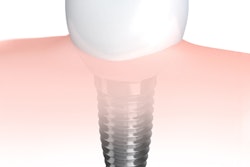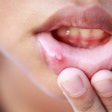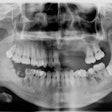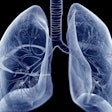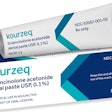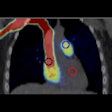
Can titanium dental implants cause inflammation? I used to believe the answer was "No." Now, published research suggests the answer may be "Yes."
 Alvin Danenberg, DDS.
Alvin Danenberg, DDS.An estimated 3 million people in the U.S. have dental implants, according to the American Academy of Implant Dentistry, and that number is increasing by 500,000 each year. In addition, more than 95% of these implants seemingly have been successful and symptom-free. Complex healing stages must occur before a dental implant becomes attached to surrounding bone tissue, according to a 2016 study in Clinical Implant Dentistry and Related Research (February 2016, Vol. 18:1, pp. 192-203). But, all this may need to be reinterpreted and further investigated.
I see patients all the time with existing dental implants that are functioning well with no obvious infection and no obvious inflammation. However, I see a few patients with infection around implants that is causing rapid destruction of the supporting bone. Some reasons for this destruction are obvious to me as a periodontist:
- Poor oral hygiene and unhealthy food choices allowed a bacterial infection to take hold around dental implants as it would around natural teeth.
- Sometimes there was excess cement under the crown that attached to the implant, which caused inflammation and infection.
- There might have been excessive biting forces on the implant, putting unhealthy pressures on the bone.
- Occasionally, the dentist may have created damaging heat when placing the implant in the jaw, leading to bone destruction.
While I could understand and identify most of these causes, when I saw some patients with failing implants, I was stumped. I could not determine a cause, and science wasn't able to give me an answer.
Perplexing problem
One question I needed answered was this: Was there something about the metal of titanium that was causing an inflammatory problem in the surrounding tissues?
After I reviewed a 2010 study in the Journal of Orthopedic Research (November 2010, Vol. 28:11, pp. 1418-1424), I became concerned. I found documentation that medical implants using titanium sometimes created problems in the bone. Some of these implants in various areas of the body created chronic inflammation and severe bone destruction. This breakdown was without infection and was apparently related to titanium particles that were released into the tissues.
Up until now, I could not find peer-reviewed studies that addressed the potentially damaging effects of titanium particles from dental implants, but three studies are changing that impression. I wondered if there was a cause-and-effect relationship of titanium particles creating inflammation in the jawbone?
“I wondered if there was a cause-and-effect relationship of titanium particles creating inflammation in the jawbone?”
A 2015 study from the Journal of Oral Implantology (February 2015, Vol. 41:1, pp. 10-16) evaluated 22 dental implants from various international implant companies. Surprisingly, 7 out of 22 "sterile" implants had endotoxin contamination on their surfaces, which would generate an inflammatory response in the body.
A 2016 study from the Journal of Periodontology (November 18, 2016) reported that bacteria around dental implants could trigger inflammation. In addition, these bacteria also caused corrosion on the titanium implant surfaces. Corrosion dissolved the titanium surface and released titanium particles into the surrounding periodontal tissues. These particles aggravated the inflammatory response. These researchers also noted that fluoride ions from mouthwash, toothpaste, drinking water, and food could potentially cause corrosion on titanium implant surfaces.
The third study, from Scientific Reports (January 6, 2017), showed that titanium particles actually were released from an implant surface after it was cleaned with ultrasonic scaling instruments. These titanium particles reacted with immune cells in test cultures, which led to bone destruction. In addition, researchers studied the results of placing these titanium particles into bones of mice. The result was severe inflammation, which quickly caused the bone to melt away. This same study showed that these titanium particles were more damaging than specific types of bacteria, which were the cause of severe periodontal disease.
Beyond the mouth
My concern goes beyond damage to the jawbone, which is serious enough. My concern is that these titanium particles could leak into the blood system. Once in the blood system, they could cause other serious chronic inflammatory reactions affecting other organ systems. And, all of this might take many years to manifest.
A 2017 animal study in Cellular and Molecular Gastroenterology and Hepatology (January 2017, Vol. 3:1, pp. 82-98) reports that harmful bacterial particles from the gut can enter the blood system and cause chronic inflammation, resulting in various chronic and autoimmune diseases. As I mentioned, these diseases could take decades to develop clinically. Since titanium particles have been shown to cause more inflammation than bacterial fragments, what potential damage could free titanium particles produce?
Moving forward
I am concerned. Dental titanium implants are an excellent way to replace missing teeth. Yet, titanium particles can be released from the surface of these implants. These particles have been shown to cause inflammation, which may translate into implant loss and potentially serious chronic diseases over time. Well-designed studies must be devised and published to give us more information about what is happening with titanium implants and what needs to be done.
A version of this column first ran on Dr. Danenberg's blog. DrBicuspid.com appreciates the opportunity to reprint it.
Alvin Danenberg, DDS, practices at the Bluffton Center for Dentistry in Bluffton, SC. He is also on the faculty of the College of Integrative Medicine and created its integrative periodontal teaching module. He also spent two years as chief of periodontics at Charleston Air Force Base earlier in his career. His website is drdanenberg.com.
The comments and observations expressed herein do not necessarily reflect the opinions of DrBicuspid.com, nor should they be construed as an endorsement or admonishment of any particular idea, vendor, or organization.




